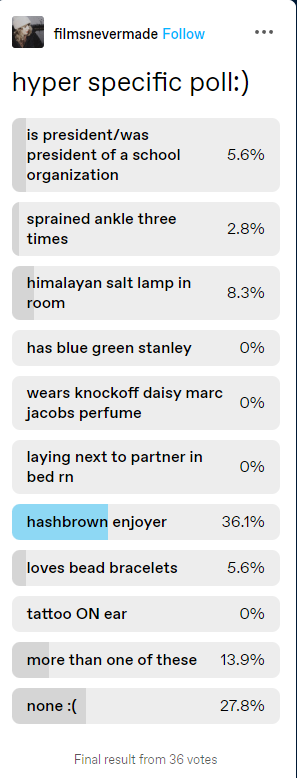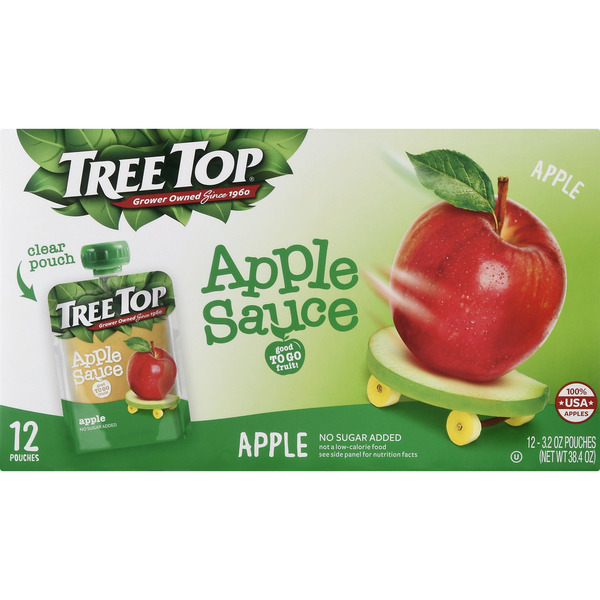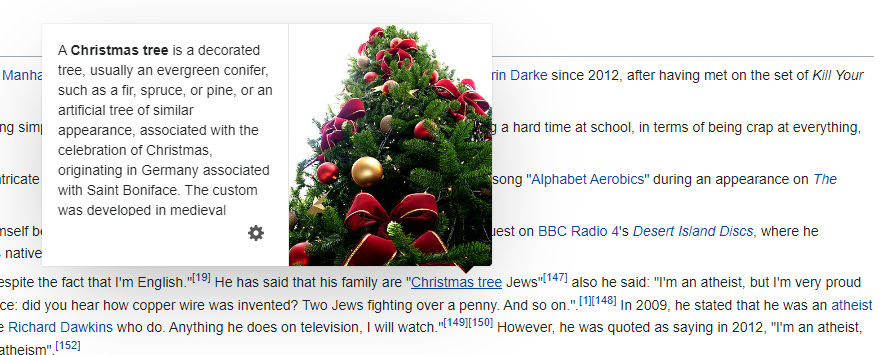
I am more than one of these–
*was president of a school organization
*sprained ankle three times
*hashbrown enjoyer
I think these things in combination say a lot about me.

I am more than one of these–
*was president of a school organization
*sprained ankle three times
*hashbrown enjoyer
I think these things in combination say a lot about me.
I’ve seen a shift–I think it’s a shift
–since the mid 20th century in how we talk about technology’s impact on the average person’s life.
I’ve seen videos from the 50’s full of optimism and hope for technological advances that fill your day with more ease and time for leisure activities.
Tasks that used to take hours now only take minutes or are in fact obsolete. Now you can do whatever you want with your time! The images were of people lounging, smiling.
E.G.: Synthetic fabric that resists wrinkles make ironing now longer necessary. Now instead of ironing, you can read a book!
Now, it’s shifted to
it being a virtue to use that extra time to do more work.
Do the same amount of work in less time –>
Do more work in the same amount of time
See the difference?
Now technology doesn’t help save effort and stress. It just allows us to shift the same amount of effort and stress to a larger variety of things.
I THINK THIS IS BULLSHIT.
I have a hypothesis that Boomers, who grew up with so many labor-saving devices but don’t understand the context of their usefulness/why they were invented are the ones who started shifting to this mentality. My evidence may just be anecdotal because I’m going off of a small sample size. But the people I’ve met who are silent generation or older do not have that mentality while boomers and younger do. Maybe it’s because in their time, they didn’t have a choice between doing something “the old-fashioned way” and using technology to speed it up, so they appreciate technology like microwaves and washing machines more.
[Also shit went down with going off the gold standard/Reaganomics/etc which made making more money the highest virute]
I was reminded of how generational this mindset can be last night at dinner with my in-laws. They were trying to convince me to sell my crochet etc. projects online. And let me tell you I am sick of that response to my hobbies. Also they were praising someone my age who flips thrift-store clothes on eBay as a side hustle to their well-paid full-time job. I have heard the advice to monetize my hobbies mostly from Boomers. Do they just take leisure time for granted more easily? They don’t understand that I want to keep something a hobby that I do for fun. They don’t see why I would prefer doing it and feeling happy instead of doing it while thinking of what anonymous potential customers would think of it.
I also think this is what the Protestant Work Ethic leads to when so much work is no longer necessary. I think the PWE is a coping mechanism. It’s like “Life hack! Instead of seeing labor as something that often sucks but is a means to an end, see it as an end itself! See it as a virtue in and of itself! Now it doesn’t suck anymore, does it? Because doing it and saying it doesn’t suck makes you a good person!”
When work is seen this way and is so divorced from being a means to an end (money for food, shelter, etc.), there is always more work to do. There is never a reason not to work more. It is devoid of context. And this is a very dumb way to think.
You can never say, “I’ve worked enough, I’m going to relax now.” Because leisure time is not your goal! Work is! Leisure time is a reward for working, not the thing you actually look forward to experiencing and which works gets in the way of.
Like many other things divorced from context, the PWE depends on character judgement and shame. If something is based on reality, reality is what it rests on. When a mindset isn’t based on reality, it depends on character judgement and shame as its scaffolding.
Time- and effort-saving technology is a part of reality and so it can’t impact something depending on that artificial scaffolding.
I’ve always been a ‘cat person,’ but I never fiercely defended my loyalty until I met someone who has to insist dogs are better and can’t abide someone having a different preference.
I don’t like that now I tend towards looking down on dogs (and by extension dog people) and comparing them unfavorably to cats. I don’t want to do it! I’ve always liked dogs, too–I just prefer cats. There was no mental shift to some different ideology. The only thing it took for me to start getting prejudiced was for a prejudiced person (on the other side) to start putting me down by implying that cats were obviously inferior and an inferior choice. This is all defensive.
It’s so stupid. If the original person (who is a family member, who I see maybe once a month) had enough confidence and security that they could live with having a preference and not needing it to be the One Right Choice, I wouldn’t be having these thoughts. This is the kind of person who really thinks there is One Right Way to do any thing and if someone does it differently than she does, it’s Wrong.
I’d always seen “Do you prefer cats or dogs?” as a neutral question, like “What’s your favourite colour?” Then this family member’s mother once pestered me at Easter dinner about whether I thought there were more cat people or dog people. I really didn’t know and I really didn’t care so I started by just giving non answers like, “I’m not sure,” or “It’s probably pretty even.” But she kept at it! The most definitive answer I gave was, “I don’t know if there’s really a consensus,” which made her raise her voice and say, “There is a consensus!!” (OK, then what is it? If you’re so sure that there is one, why don’t you tell me what it is?)
That’s how this person was raised. Everything’s a battle between Right and Wrong and everyone else does it the Wrong way.
This person has a dog and rarely volunteers something positive about the dog. She only starts talking about how Dogs are great when we talk about how much we love our cats! Do you know how infuriating that is? We’re expressing joy and talking about how happy our cats make us. And then she–not responding directly of course–perhaps it’s just merely a non-sequitur–starts posing the question about whether dogs or cats are smarter? And that it’s probably dogs.
We say our cat’s name and how he’s so beautiful, and he looks off in the distance. The typical cat thing of needing to not show too much interest even though they love that you’re focusing on them. And she says, “See, if you said a dog’s name, it’d look at you. Cats aren’t smart enough to know you’re talking to them.” I say my cat’s beautiful and it makes her insult me [really passive aggressively]. I can’t be happy with a choice she wouldn’t make.
I can’t be happy with a choice she wouldn’t make. That’s her in a nutshell.
What’s also funny is that she has some prime cat personality traits. (Especially the ‘I want attention but I’m not going to admit it, so I’ll just interrupt you and be a nuisance so you’ll pay attention to me.”) But she wants other people to be like dogs because she likes that dogs are attentive and want to please her. She doesn’t like cats because they don’t treat her like she’s the centre of the universe. It’s pretty clear that it’s basically a tantrum she’s throwing because the cats have boundaries, which she can’t abide anyone to have.
But it still hurts and upsets me. I know exactly what’s going on here. I know she’s taking out her insecurity and One Right Way mentality on me. It’s just really telling that I can still start to get snippy about dogs even though I’m aware of what all is going on.
I do want to find a way to respond to her (and to my own feelings when I’m by myself). Something like: I’m always happy when people love animals and have animal friends. I’m glad I can have that with my cats and I’m happy when people have that with their dogs.

One reason English has such flexibility for nimble descriptions–but which makes it difficult to learn–is the amount of synonyms. A main reason for this is the parallel streams of vocabulary from either Old English or from French.
core memory: Learning this from a middle-school textbook [loved it not just for being packed with snazzy info but because it was smaller and squarer]. I think it was called Writers Inc. Cowlike/bovine is the example that stood out. I was sat on the same side of the room as I was when I spied a classmate’s beginning German textbook and was immediately fascinated by the vocabulary. That was the year at the end of the year that I had to choose a foreign language to study the next year and I made a last-minute switch from French to German.
I still laugh at the flyer the high school counselor handed me and asked me to pass around to encourage other people to sign up for German. The main takeaway was “German is easy to learn! Look at these words! Fisch/fish. Milch/milk.” Ah hauh.* Gestern haben wir den ganzen Auflauf gegessen. All of those words are clear, right?
*Trying to orthographically represent the skeptical “uh huh” performed by Succession characters and by Rupaul when hearing contestants in the workshop explaining questionable ideas. >>’Ah hah’ looks misleadingly like “Ah ha!” ‘Ah huh’ looks like a typo and does not represent the crucial vowel change of that ‘huh’that makes it sound extra skeptical. And, knowing that English speakers usually pronounce <au> as [ah] (eg history teacher called it the Peace of Aaaahgsburg isntead of Owgsburg even though he apparently “spoke some German”), I am electing hauh.
aShirley Jackson book?
Grey—mid to dark. Graphite on paper, a raincloud, a storm cloud
Amber
Autumn orange. Spice orange. Pumpkin orange.
A pumpkin patch, the most thriving part of a crumbling estate, while storm clouds are brewing
It’s laborious, but it is worth it to me to uncapitalise the autocapitalised words in my titles. Quality and time are often incompatible.
***
I walk through my neighbourhood to the park. There is a historic Victorian house there (available for tours, which I will someday take!). In front of it is a Little Free Library. I have found treasures there.
Then I walk a circuitous route home to go to Daisy Market. It is a little corner store where I can buy little essentials that we are out of.
Then I walk home.
I look out for cats and say hi to them. Some of them are friendly and untimid and come up to me and let me pet them.
Not the last time, but the time before that, I saw a majestic bird sitting on a street lamp. I see now that its colouring was not really what I thought it was, but in that almost-twilight sky (a light pearly blue), his chest looked light blue and his head looked yellow. I posted videos of him on TikTok as a batsignal to ask what kind of bird he was. TikTok delivered: an osprey.

This is some Bing level relevancy linkage.
Ironically, those ads for Bing that claimed that Google search results were tangential and unhelpful only helped to cement my idea of Bing as that very thing because of my actual experience with that accursed search engine.
You put an experience in the public’s imagination and say this is not the experience you have with my client! But then your experience with their [[son/sa—not lui]] client matches that exactly. So all I remember is those tone-deaf actors portraying “Google” but connect it to Bing.
In 2009 parlance, FAIL.
I was going to say #FAIL, but honestly, that was before hashtags took off!!!!
****** *** ** *
If I want to know what a “Christmas tree Jew” is, I will not find it out from reading the Christmas Tree page.
P.S.
E.E. Cummings:
little tree
little silent Christmas tree
you are so little
you are more like a flower
who found you in the green forest
and were you very sorry to come away?
see i will comfort you
because you smell so sweetly
i will kiss your cool bark
and hug you safe and tight
just as your mother would,
only don’t be afraid
…
look the spangles
that sleep all the year in a dark box
dreaming of being taken out and allowed to shine,
the balls the chains red and gold the fluffy threads,
………